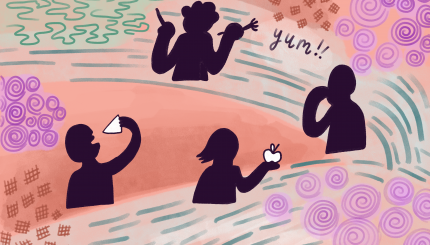It could be said that the world was created for love and our job is to share that love with one another. This is one of the many explanations for why the Torah begins with the enlarged letter bet, which represents the number two, reminding us that we are here to connect with another. A further allusion can be seen in the last letter in the Torah, a lamed, which when joined to the bet spells the Hebrew word lev, meaning heart.
But how do we find and maintain loving relationships? These three teachings from the Hasidic masters give us a clue.
The mind must rule over the heart (Rabbi Schneur Zalman of Liadi)
While the movie version of love suggests it’s about following your heart, that doesn’t work so well in real life. Emotions are powerful, but not necessarily trustworthy. We are fickle. We can feel one way one minute, and very differently the next. If we only respond emotionally, without trying to balance what we feel with what we think, we can land ourselves in some pretty unhealthy situations.
Allowing the mind to rule over the heart doesn’t negate feelings, but it does remind us that love must be aligned with and led by the intellect. If we can’t articulate what qualities we admire in our partner, what commonalities we share, what goals we want to achieve together, or how this person betters our life, we are likely being led by hormones, desire, infatuation and passion. All good things — to a point. If the mind gives the OK, let the heart go wild. But if your mind is raising red flags, pay attention. It knows what it is talking about.
With your help, My Jewish Learning can provide endless opportunities for learning, connection and discovery.
This is not just good advice for determining whether to begin or stay in a relationship, but throughout a relationship. When we get upset, we often react without thinking. We get hurt, angry, resentful and then respond in ways that likewise cause hurt, anger and resentment. When we let the mind rule over the heart, we can separate the facts of the situation (what we think) from the emotions (what we feel).
In the Tanya, the work of Hasidic philosophy that Schneur Zalman published in 1796, it says there are three garments that clothe the soul: thought, speech and action. That is the order of operations we should follow in love as well. Before we say or do anything, think. Let the mind rule over the heart until we can be more rational about what we say and do. Only once we have worked through our thought and speech are we ready to act.
When something bothers you in another, it is an opportunity to look deep within and see that flaw within yourself (Meor Enaim)
This Hasidic teaching, related by Rabbi Menahem Nahum of Chernobyl in the name of the Baal Shem Tov, is another method for working through negative feelings when we are upset or hurt in our relationship. It is much easier to criticize another than to look carefully at our own behavior. And yet, when we take an honest look at ourselves, we often find that there is something in us that explains why we are bothered by something that someone else did.
Sign up here for My Jewish Learning’s email series about how Hasidic wisdom can improve your life.
Ever been out for the evening with a group of friends and at the end of the evening everyone was bothered by something else? One friend was annoyed by the person who wouldn’t stop talking, dominating every conversation. Another noticed someone else’s egoism. No doubt, there is some truth to each of these. Yet there is a reason each thing bothered those particular people and no one else really noticed.
We are most often triggered by the very things we struggle with ourselves. Looking within can help us become much more empathetic when dealing with another. If we understand that we are bothered by the domineering talker because we often do the same thing, then we are less likely to be angry and instead recognize our shared struggle to be noticed.
In relationships, this is essential. If we are able to understand our own weaknesses and insecurities, we are that much more able to then accept them in another.
A person is where his thoughts are ( Baal Shem Tov)
While it may seem that our actions are what affect reality, this Hasidic teaching tells us that our thoughts are the foundation of all reality.
When a couple starts dating, all they can do is think about each other. But as time goes on, it becomes all too easy to get distracted and take the relationship for granted. The Baal Shem Tov reminds us that what you think about will be what is most important to you. If you want a loving relationship, you need to think about your love.
Thought is active, not passive. It isn’t enough to say that you are “always thinking of them.” Rather you need to consciously, proactively and mindfully choose to think about the person you love. And here is the real twist. When relationships begin to burn out, it often is blamed on lack of feeling. The emotions have faded. One has fallen out of love. The passion is gone. The same way feelings can get a person into the wrong relationship, they can likewise get a person out of the right relationship.
Once again, the mind must rule over the heart. Even if one is not “feeling” it, the mind must ask the tough questions. Is my partner a good person? Have I been a good partner? Is my partner loyal? Am I treated well? Do I treat my partner as they deserve? Do we have shared goals and a future that we can achieve? If the relationship is truly a healthy one and what is missing are the feelings, then the mind can come to the rescue.
Happiness is not merely a feeling that the heart determines, but is the result of how we think. This is why, the Baal Shem Tov explains, the Hebrew letters of the word b’simchah, meaning joy, are comprised of the same letters as machshava, which means thoughts. These are not emotions that just come and go based on circumstances, but realities that we create with our thoughts. A person is where their thoughts are. If one is not feeling happy in the relationship, the mind can shift it. When we determine that we want to be happy, that we want our partner to be happy, and we focus our thoughts and energy on the other, then we allow the joy to permeate not only our thoughts, but our speech and action and reignite the heart so that mind and heart are aligned and fueled by love.
Want more? MJL’s “Discovering Jewish Spirituality” email series will guide you through authentic Jewish methods of bringing spirituality into your everyday experience. Sign up here.
Enhance your spirituality journey by joining our weekly Jewish Meditation Moment for a brief Jewish teaching followed by a guided meditation.



